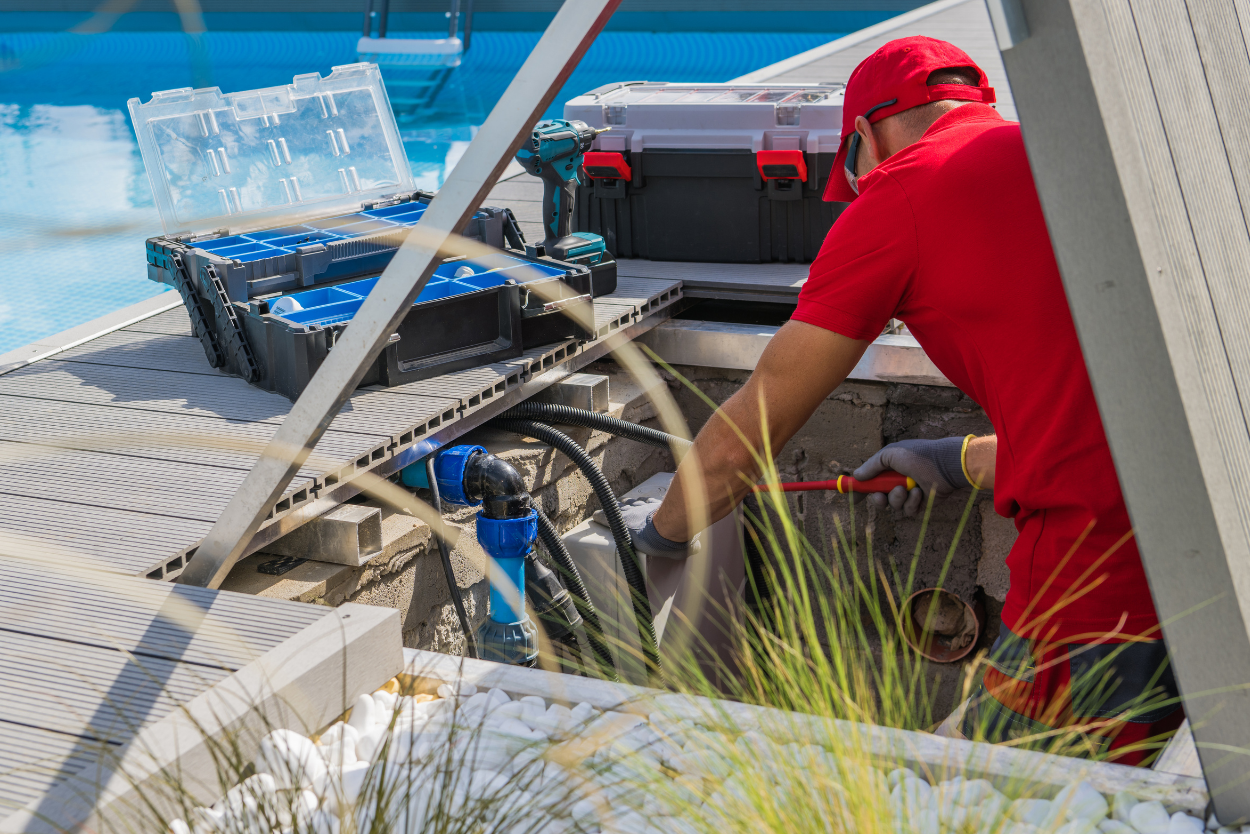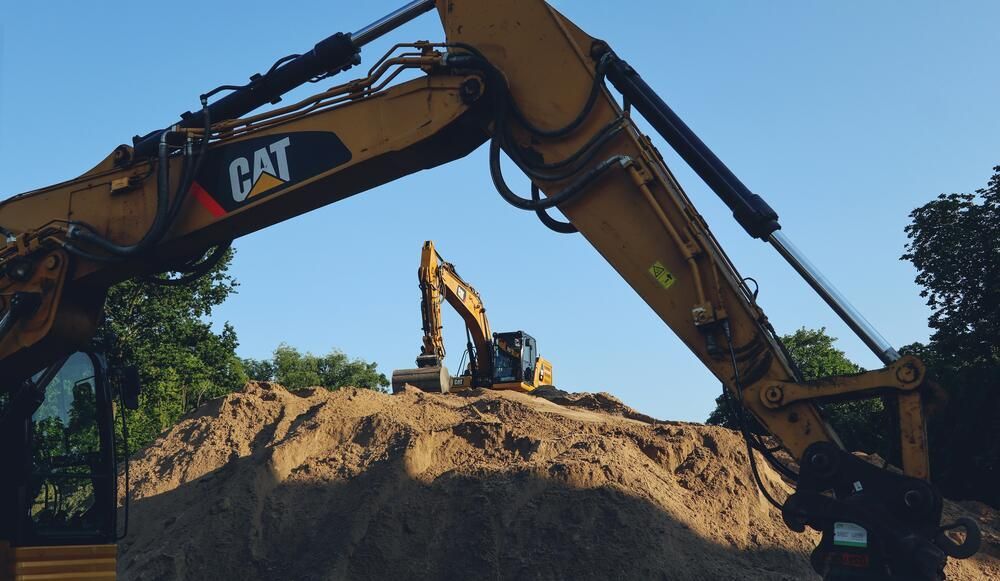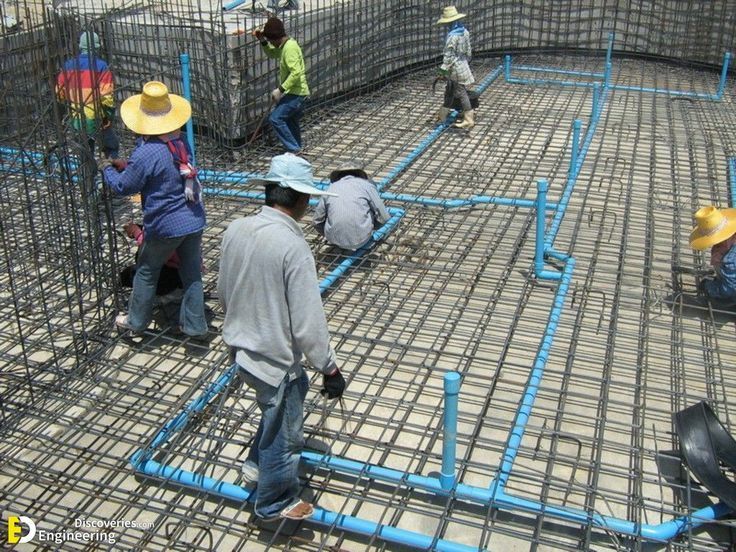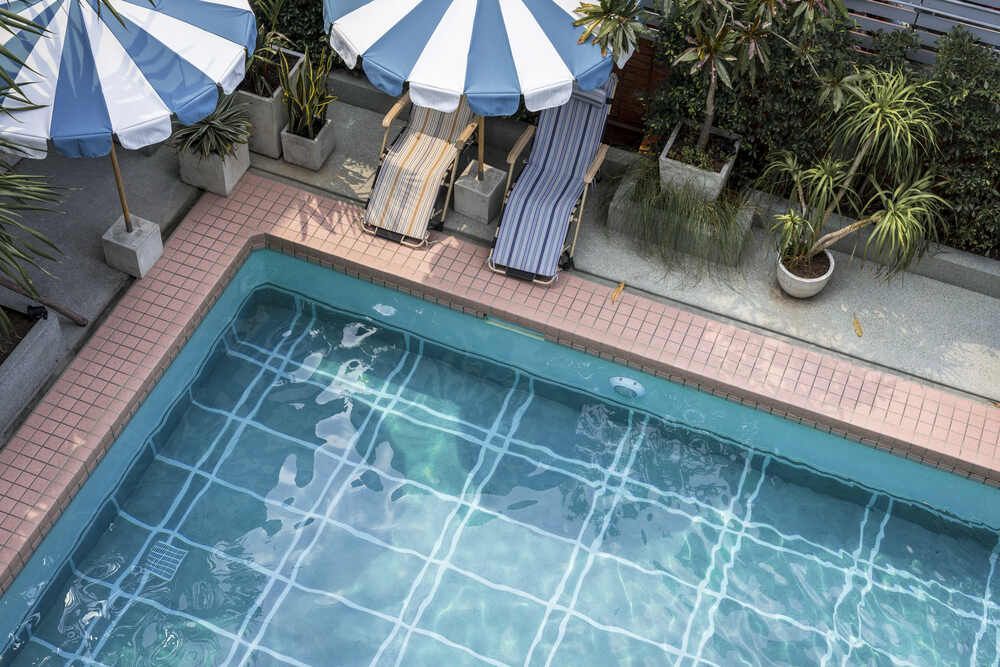The Ultimate Guide to Pool Maintenance According to Pool Companies

Maintaining a pristine pool is not just about enhancing the aesthetic appeal of your backyard; it's crucial for ensuring a safe and enjoyable swimming experience. Pool companies emphasize the importance of regular maintenance to extend the lifespan of your pool and avoid costly repairs. Discover everything you need to know to keep your pool in top condition, based on the expert advice from leading pool companies near me in Danbury, CT.
Table of Contents
Key Takeaways
How to Understand Your Pool's Needs
What are the Essential Pool Maintenance Tasks by Frequency?
How to Balance Water Chemistry for a Healthy Pool
What are Common Pool Problems and How Should You Address Them?
Frequently Asked Questions
Choose FJV Construction for Your Dream Pool in Danbury, CT!
Key Takeaways
✔ In-ground and above-ground pools have different maintenance needs, with specific care required for materials like concrete, fiberglass, and vinyl.
✔ Essential pool components include the pump, filter, skimmer, and heater, each needing regular checks and maintenance for optimal performance.
✔ Skim debris daily and check water levels to maintain water quality and equipment functionality.
✔ Brush walls, vacuum the pool, and balance water chemistry, focusing on pH, alkalinity, and chlorine levels as weekly maintenance tasks.
✔ Monthly maintenance includes cleaning or replacing filters and inspecting equipment for issues like leaks or unusual noises.
✔ Seasonal tasks involve opening and closing the pool, balancing water chemistry, and winterizing equipment.
✔ Proper water chemistry requires maintaining pH, total alkalinity, chlorine, calcium hardness, and cyanuric acid levels.
✔ It is crucial to store chemicals properly, avoid mixing them, and follow manufacturer instructions for safety.
How to Understand Your Pool's Needs
Pool maintenance varies significantly depending on the type of pool you have. Pool companies categorize pools into two main types: in-ground and above-ground.
In-ground pools are permanent structures, usually made of concrete, fiberglass, or vinyl. Each material has its maintenance needs; for instance, concrete pools require regular brushing to prevent algae growth, while vinyl liners are susceptible to tears and need gentle cleaning.
Key Components of a Pool
Understanding the key components of your pool is crucial for proper maintenance and overall pool health. Each component plays a vital role in ensuring the pool operates efficiently and remains clean and safe for use. Regular checks and maintenance by pool companies of these key components are crucial to avoid potential issues such as equipment failure or water quality problems.
1. Pump
The pump is often referred to as the heart of the pool system. It circulates water through the pool's filtration system, ensuring that the water is continually cleaned and mixed. A well-functioning pump helps distribute chemicals evenly throughout the pool, preventing the growth of algae and bacteria. Pool companies emphasize the importance of the pump in maintaining water clarity and hygiene.
2. Filter
The filter is responsible for removing impurities from the water, such as dirt, debris, and microscopic contaminants. There are three main types of filters: sand, cartridge, and diatomaceous earth (DE). Each type has its own maintenance requirements, but all need to be cleaned regularly to maintain efficiency. Pool companies highlight that regular backwashing (for sand and DE filters) or replacing cartridges (for cartridge filters) is necessary to ensure optimal filtration.
3. Skimmer
Skimmers are surface-level devices that collect floating debris like leaves, insects, and oils. They prevent these materials from sinking to the bottom and contaminating the water. Skimmers are usually located along the pool's perimeter and are crucial for maintaining water cleanliness and reducing the workload on the filter. Pool companies advise regular cleaning of skimmer baskets to ensure they function effectively.
4. Heater
The heater is used to regulate the pool's water temperature, providing a comfortable swimming environment regardless of the weather. There are various types of heaters, including gas, electric, and solar. Pool companies suggest routine maintenance of heaters, including checking for proper operation and ensuring that the heater is free of scale and debris.
What are the Essential Pool Maintenance Tasks by Frequency?
Proper pool maintenance is a year-round commitment that involves a variety of tasks, each with its own frequency. Understanding what needs to be done daily, weekly, monthly, and seasonally helps ensure that your pool remains clean, safe, and in good working order. Pool companies emphasize that regular maintenance not only enhances the pool's appearance but also prevents potential issues and costly repairs.
Daily Maintenance Tasks
Skimming the Pool's Surface
Daily upkeep, even on days when the pool isn't used, is crucial for maintaining water quality. Pool companies near me recommend skimming the pool's surface daily to remove leaves, insects, and other debris. This simple task prevents debris from sinking, which can lead to water contamination and strain on the filtration system.
Checking the Water Level
Additionally, daily checks of the water level are advised to ensure it remains within the optimal range, which is typically halfway up the skimmer opening. Maintaining proper water levels prevents the pump from running dry and ensures efficient filtration.
Weekly Maintenance Tasks
Cleaning the Pool Walls and Floor
Weekly maintenance tasks are more comprehensive and involve cleaning and chemical adjustments. Pool companies suggest brushing the pool walls and floor weekly to prevent algae growth and the buildup of dirt. This is particularly important for plaster and concrete pools, where algae can easily take hold.
Vacuuming the Pool
Vacuuming the pool, either manually or with an automatic cleaner, is also recommended to remove settled debris that brushing may have loosened.
Testing and Balancing Water Chemistry
Another critical aspect of weekly maintenance is testing and balancing the water chemistry. Pool companies highlight the importance of maintaining proper pH (7.4-7.6), alkalinity (80-120 ppm), and chlorine levels (1-3 ppm) to ensure the water is safe for swimmers and to protect the pool surfaces and equipment. Weekly chemical adjustments help prevent issues like cloudy water, algae blooms, and corrosion.
Monthly Maintenance Tasks
Cleaning or Replacing the Pool Filter
Monthly tasks involve more detailed inspections and cleanings. One of the primary tasks is cleaning or replacing the pool filter, depending on the type. Pool companies note that a clean filter is essential for keeping the water clear and ensuring the filtration system operates efficiently. Sand filters may require backwashing, cartridge filters might need rinsing or replacing, and DE filters need periodic backwashing and recharging with diatomaceous earth.
Inspecting Pool Equipment
In addition to filter maintenance, pool companies recommend a thorough inspection of all pool equipment, including the pump, heater, and automatic cleaners. Checking for leaks, unusual noises, and wear and tear can help identify potential problems before they become significant issues, ensuring the pool system operates smoothly.
Seasonal Maintenance Tasks
Spring Maintenance
Seasonal changes require specific pool maintenance tasks to ensure optimal performance throughout the year. In the spring, this includes removing the winter cover, cleaning the pool, balancing water chemistry, and inspecting equipment.
Summer Maintenance
During summer, managing water levels and adjusting chemicals based on usage and weather are key to maintaining a clean and safe pool.
Autumn Maintenance
In the autumn, it’s important to prepare the pool for the upcoming winter. This involves removing falling leaves and debris, continuing regular cleaning and chemical adjustments, and starting the process of winterizing the pool.
Winter Maintenance
For winter, it’s crucial to winterize equipment by draining water from the pump, filter, and piping, adding winterizing chemicals, and covering the pool to prevent damage and contamination.
How to Balance Water Chemistry for a Healthy Pool
Balanced water chemistry is crucial for maintaining a healthy and safe swimming environment. Pool companies emphasize that the correct chemical levels not only protect swimmers from skin and eye irritation but also prevent damage to the pool's surfaces and equipment. Unbalanced water can lead to several issues, including corrosion of metal parts, scaling on pool surfaces, and an overall decline in water quality.
Key Chemical Levels to Monitor
To maintain optimal water chemistry, it's important to regularly test and adjust the following key chemical levels:
1. pH
The pH level measures the acidity or alkalinity of the water. A balanced pH of 7.4 to 7.6 is ideal for swimmer comfort and equipment longevity. Low pH can cause the water to become acidic, leading to corrosion of metal components and irritation for swimmers. High pH, on the other hand, can result in cloudy water and reduce the effectiveness of chlorine.
2. Total Alkalinity (TA)
Total alkalinity acts as a buffer for pH levels, helping to prevent drastic changes. Pool companies near me recommend keeping TA between 80-120 ppm (parts per million). Proper alkalinity levels stabilize pH, preventing fluctuations that can cause discomfort to swimmers and damage to pool surfaces.
3. Chlorine
Chlorine is the primary disinfectant used in pools to kill bacteria and other harmful microorganisms. The ideal chlorine level is 1-3 ppm. Too little chlorine can result in poor sanitation, while too much can cause skin and eye irritation. Pool companies advise regular testing and adjustment to maintain the correct chlorine level.
4. Calcium Hardness
Calcium hardness refers to the concentration of calcium ions in the water. The recommended range is 200-400 ppm. Low calcium levels can lead to corrosive water, damaging pool surfaces and equipment. High calcium levels can cause scaling, which appears as a white, crusty deposit on pool walls and fixtures.
5. Cyanuric Acid
Also known as a chlorine stabilizer, cyanuric acid helps protect chlorine from being broken down by sunlight. The recommended level is 30-50 ppm. Pool companies suggest monitoring this level carefully, as too much cyanuric acid can reduce chlorine's effectiveness and may cause
health risks such as acute gastrointestinal diseases.
Using Pool Chemicals Safely
Safety is paramount when handling pool chemicals. Pool companies recommend following these guidelines:
Read Labels and Follow Instructions
Always read the labels and follow the manufacturer's instructions for each chemical product. This ensures proper usage and prevents accidental misuse.
Proper Storage
Store chemicals in a cool, dry place, away from direct sunlight and moisture. Keep them out of reach of children and pets.
Avoid Mixing Chemicals
Never mix different chemicals unless explicitly stated by the manufacturer. Mixing can cause dangerous reactions, including the release of toxic gases or even explosions.
What are Common Pool Problems and How Should You Address Them?
Maintaining a pool involves not only routine upkeep but also addressing common problems that can arise. Understanding these issues and knowing how to handle them can help keep your pool in optimal condition.
1. Algae Control and Prevention
Algae is a common issue for pool owners, appearing in various forms such as green, yellow, and black algae. Beyond being an aesthetic nuisance, certain types of algae and cyanobacteria can release harmful toxins, posing significant health risks to humans, animals, and the environment.
Regular Brushing and Chemical Balance
To prevent and control algae growth, pool companies emphasize the importance of regular brushing of pool surfaces and maintaining balanced chemical levels, particularly chlorine. Chlorine helps inhibit algae proliferation and prevents biofilm formation, which can further degrade water quality.
Shocking the Pool
If algae do develop, shocking the pool with a large dose of chlorine or other sanitizers is often necessary. This process helps to eliminate algae and restore water clarity.
Using Algaecides
For more stubborn cases of algae, specialized algaecides may be required. These chemicals are formulated to target and eliminate persistent algae problems.
2. Dealing with Cloudy or Murky Water
Regular maintenance, including proper chemical dosing and ensuring good filtration, is key to preventing cloudy water from recurring.
Check the Filtration System
Cloudy or murky water is another common issue that can result from several factors, such as poor filtration, high bather load, or imbalanced water chemistry. Pool companies recommend starting with a thorough check of the filtration system, ensuring it is clean and functioning correctly. A dirty or clogged filter can significantly reduce water clarity.
Test and Adjust Water Chemistry
Next, test the water to assess levels of chlorine, pH, and alkalinity, as imbalances can also cause cloudiness. Adjusting these levels and using a pool clarifier can help restore water clarity.
3. Handling Pool Stains and Scaling
Stains can be caused by metals like iron or copper in the water, which can deposit on pool surfaces, or by organic materials like leaves and algae. Scaling, a buildup of calcium or other minerals, usually occurs when the water's pH or calcium hardness is too high.
Treating Metal Stains
For metal stains, using a metal sequestrant can help remove the stains from pool surfaces. This chemical treatment binds with metals in the water, allowing them to be filtered out more easily.
Addressing Organic Stains
Organic stains may require shock treatments and thorough cleaning to remove the discoloration caused by leaves, algae, or other organic materials.
Preventing Scaling
To prevent scaling, maintaining balanced water chemistry, especially keeping pH and calcium hardness in check, is essential. Regular testing and adjustments help avoid the conditions that lead to mineral buildup.
4. Repairing Pool Equipment
Pool equipment, including pumps, filters, heaters, and more, is vital for maintaining a clean and safe swimming environment. Regular inspections are recommended to catch early signs of trouble, such as unusual noises, leaks, or decreased efficiency.
Addressing Issues Promptly
Addressing these issues promptly can prevent further damage and costly repairs. Quick action helps ensure the equipment continues to function properly and avoids potential problems down the line.
Repair vs. Replacement
The decision to repair or replace equipment often depends on factors like the age of the equipment, the extent of the damage, and the cost-effectiveness of repairs versus replacement. Evaluating these factors helps determine the most practical solution.
Consulting with Professionals
Consulting with professionals can provide clarity on the best course of action. Experts can offer advice on whether repairing or replacing equipment is the most efficient and cost-effective choice.
Frequently Asked Questions
What should I do if my pool water has a strong chemical odor?
A strong chemical odor in pool water is typically a sign of chloramines, which form when chlorine combines with contaminants. Pool companies suggest shocking the pool to break down these compounds and restore proper chlorine levels. Regularly testing and adjusting the water chemistry, along with ensuring good ventilation around indoor pools, can help prevent this issue.
Can solar covers cause my pool to overheat?
While solar covers are excellent for retaining heat and reducing evaporation, they can also lead to overheating, especially in hot climates. Pool companies advise monitoring water temperature regularly and removing the cover during the hottest parts of the day if necessary. Alternatively, using a cover with a reflective surface can help manage heat buildup.
How can I manage pool maintenance if I am away for an extended period?
If you plan to be away, pool companies suggest having a reliable friend or neighbor perform basic maintenance, like skimming and checking water levels. Alternatively, hiring a professional pool service can ensure regular maintenance, including chemical balancing and equipment checks, is continued in your absence. Automatic pool cleaners and chemical feeders can also help maintain the pool during periods of low supervision.
What is the best way to manage water temperature fluctuations in a pool?
Water temperature fluctuations can be challenging, especially in regions with varying climates. Pool companies recommend using a pool heater for consistent warmth or a pool chiller for cooling in hot climates. For natural management, a solar cover can help retain heat during cooler nights and reduce temperature drops. Monitoring weather forecasts and adjusting heating or cooling systems accordingly can also help maintain a comfortable water temperature.
What steps should I take if my pool water foams or has a soapy appearance?
Foamy or soapy water can result from the introduction of lotions, soaps, or other contaminants. Pool companies advise lowering the water level and refilling with fresh water if the foam is significant. Regularly checking and adjusting water chemistry, particularly calcium hardness and pH, can help prevent foaming. Additionally, enzyme treatments can be used to break down organic contaminants.
Choose FJV Construction for Your Dream Pool in Danbury, CT!
When it comes to building your dream pool in Danbury, CT, FJV Construction is the go-to expert known for delivering quality and reliability. Our team combines years of experience with a commitment to excellence, ensuring every pool we build is not only beautiful but also built to last.
Trust us to bring your pool project to life in Danbury, CT, and experience unparalleled customer service and support from start to finish. Dive into a partnership with FJV Construction today and transform your backyard into a stunning, luxurious retreat!
Our Info
Monday to Friday from 7 am to 6 pm
Saturdays from 8 am to 5 pm
We Accept Cash and Checks
LOCATION
We Cover 80 Miles around Bethel,
Danbury, and Brookfield
Bethel, Connecticut 06801
Danbury, Connecticut 06810
Brookfield, Connecticut 06804
Navigation
Copyright FJV Construction, All Rights Reserved



